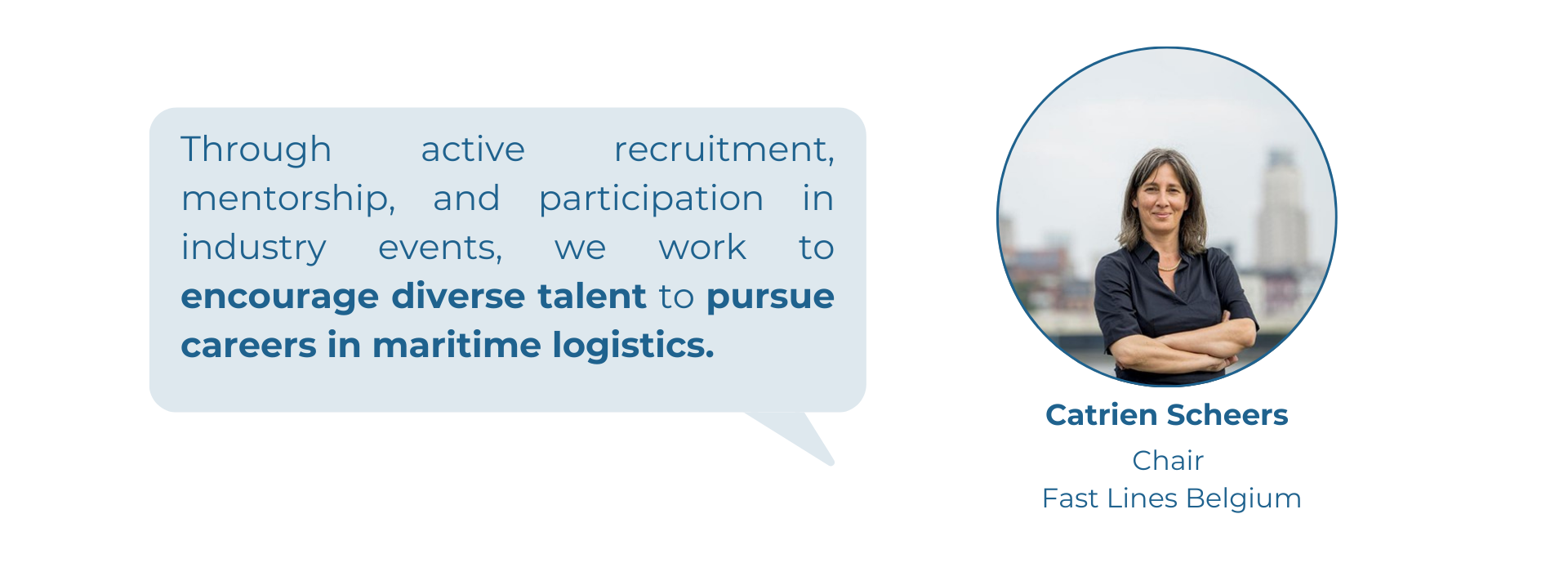Shipping People – Meet the European Shipowners
In the fourth edition of the interview series #ShippingPeople – meet the European Shipowners, we hand the microphone to Catrien Scheers, Chair of Fast Lines Belgium.
Meet Catrien Scheers, Chair of Fast Lines Belgium. After getting her master’s degree in Communication and Media Studies, she began working at the family transport business Fast Lines Belgium. Since becoming chair, Fast Group has invested in coaster vessels and in terminal activities in the ports of Drogheda and Szczecin.

In light of the increasing digitalisation within the maritime sector, how do you anticipate these advancements will affect the role of seafarers onboard? How can the industry ensure that seafarers are equipped with the necessary skills and training to adapt to digitalisation?
At Fast Lines Belgium, we are dedicated to sustainable innovation that supports both industry progress and our workforce’s well-being. Our partnership with SEAFAR to integrate remote operation technology on our short sea vessel is a strategic move towards modernising maritime transport. By adopting advanced remote control systems, we aim to set new standards in safety, efficiency, and sustainability for shortsea shipping.
This collaboration is designed to alleviate the demands of intensive trade schedules by enhancing operational efficiency and creating valuable rest periods for crew members. Remote operations address essential needs in short sea shipping, supporting a balanced work environment.
We see this partnership as part of a broader shift toward digitalisation in shipping, which is essential for a sustainable and competitive European maritime sector. We’re proud to play a pioneering role in driving forward the EU’s vision for a cleaner and more resilient shipping industry.
According to your opinion, which are the enabling factors to accelerate the energy transition of the industry?
Short sea shipping plays a crucial role in creating a more sustainable Europe by providing an eco-friendly alternative to road transport for intra-European freight movement. By shifting cargo from trucks to ships, short sea shipping significantly reduces congestion and greenhouse gas emissions, as vessels have a lower carbon footprint per ton-mile compared to road transport. At Fast Lines Belgium, we’re committed to advancing these benefits, and we recently ordered two of the cleanest and most efficient ships in their class, boasting the lowest Energy Efficiency Design Index (EEDI) among short sea cargo vessels.
Equipped with an efficient hull design, economic main engine, and remote monitoring system, these vessels allow real-time tracking of fuel consumption and emissions, enabling both crew and our shore-side team to optimise performance. This technology empowers us to offer our clients transparent, low-emission services, further contributing to the EU’s green transition goals and positioning ourselves as a leader in sustainable maritime transport. Beyond being shipowners, we oversee the entire logistics chain with a multimodal and sustainable approach to our customers’ supply chains. This gives us the ability to drive more impactful greening across the supply chain, seeing the bigger picture rather than focusing solely on optimising individual parts.
Diversity brings unique skills, increases innovation and fosters a more inclusive working environment. What could the industry do to increase diversity and bring opportunities for women and underrepresented groups in shipping?
At Fast Lines Belgium, we believe that diversity strengthens our industry by fostering innovation and building a more inclusive work environment. As a proud member of WISTA Belgium and WISTA International, we are committed to promoting opportunities for women and underrepresented groups in shipping. Respect and inclusion are core values, embodied in our leadership structure, while ensuring gender balance at the highest levels of our organisation remains priority.
Through active recruitment, mentorship, and participation in industry events, we work to encourage diverse talent to pursue careers in maritime logistics. Our goal is to create a workplace where every individual’s unique perspective is valued, driving both our growth and that of the broader maritime sector toward a more equitable future.
The interview with Catrien Scheers is the third in the series. Find previous versions below.
For press and media enquiries, please contact:
Luisa Puccio, luisa.puccio@ecsa.eu, +32 492 733623

